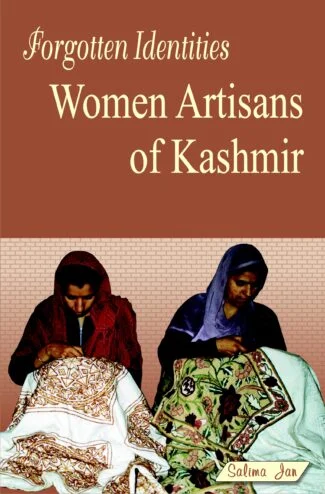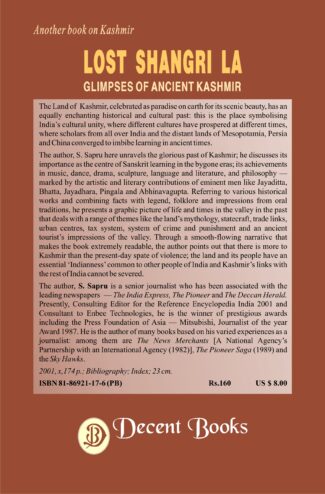

Forgotten Identities...
Forgotten Identities
by: Salima JanThe work examines adoption of handicrafts as an occupation by artisan women of Kashmir to contribute significantly to their families and the society in spite of problems of earning livelihood in a patriarchal society. Based on empirical data, it deals with their socio-economic background, the way they cope with their duties at home and those of their profession, and their aspirations and rights.
Original price was: ₹500.00.₹450.00Current price is: ₹450.00.
ISBN: 9788186921265
Year Of Publication: 2004
Edition: 1st
Pages : xi, 228
Bibliographic Details : 1 Folded map, 16 Coloured photographs, Bibliography; Index
Language : English
Binding : Hardcover
Publisher: Decent Books
Size: 23 cm.
Weight: 500
The contribution of women to sustenance and survival of cultures and civilization, as such, has assumed new proportions in the last century or so, with women engaging themselves in a range of activities for livelihood in urban centres. Their contributions have, however, largely gone unacknowledged due to various factors. This study attempts to address this aspect by focusing on the role of urban women in the handicrafts sector in Kashmir. Dr. Salima Jan examines how the artisan women, in spite of difficulties of earning livelihood in a patriachal society, have adopted handicraft as a household occupation and are contributing immensely to family and society. Based on empirical data obtained from survey and presenting case studies, the work examines the socio-economic and educational background of artisan women before delving into aspects, such as, the nature of work done by them, their wages in different handicrafts, their control over these and the conditions under which the women have opted for the role. It analyses the manner in which the women cope with their dual roles involvement in household chores as well as employment in handicrafts and deals with their individual aspirations and rights in this context i.e., their say in decision-making in families and their perceptions of job satisfaction and changing role of women. This research effort would be useful to researchers and scholars engaged in a range of sociological disciplines but, particularly, associated with sociology of work and gender studies.
Preface
1. Introduction
2. Women at Work
Women in Home-based Industry — An Overview
3. Methodology
The Study
Objectives of the Study
Hypotheses
The Universe
Some Important Demographic Features at Universe
Literacy Rate
Workforce
Sample Selection
Selection of Case Studies
Interview of the Middlemen
Construction of the Basic Tool for Inquiry
Method
Preliminary Survey
Data Collection
Data Processing and Analysis
References
4. Socio-economic Background of Artisan Women
Age and Marital Status of the Artisan Women
Education of Artisan Women
Socio-Economic and Educational Background of the Female Artisan Families
Husbands/Parents Education
Husbands/Parents Profession
Husbands/Parents income
Total male/female earning members in the family
Family Income from all sources
Type and size of the family
Head of the family
5. Artisan Women : Work and Family
What Job Female Artisans do
Handicraft Items Designed by Female Artisans
Professional Skill
Earnings of Women Artisans
How Women Artisans Spend Their Earnings?
Mode of Payment
Wages Commensurate or Not
Day of an Artisan Woman
Leisure Time
Spending of Leisure Time
Managing Household Responsibilities
Caring of Children
Outings
Motivation behind Doing Handicraft Work
Change of Job
Job Satisfaction
Participation in Decision-making Process of the Family
6. Artisan Women : Aspirations and Perceptions
Perceptions of Female Artisans with regard to Discrimination of women vis-a-vis men
With regard to status of a woman
vis-a-vis Husband
Factors that Help Get a Better Job
Job Opportunities
Aspirations of Female Artisans vis-a-vis Son/Daughter
Views of Female Artisans with Regard to Property Share/Mehar, etc.
7. Pathetic Tales
Some Case Studies of Married Artisan Women
Some Case Studies of Unmarried Artisan Women
Conclusions
8. Women Artisans — the back bone, but the exploited
9. Artisan Women — An Overview
Significance of the Study
Suggestions and Recommendations
Appendix A — Handicrafts in Kashmir
Appendix B — Statistics at a Glance
Bibliography
Index







